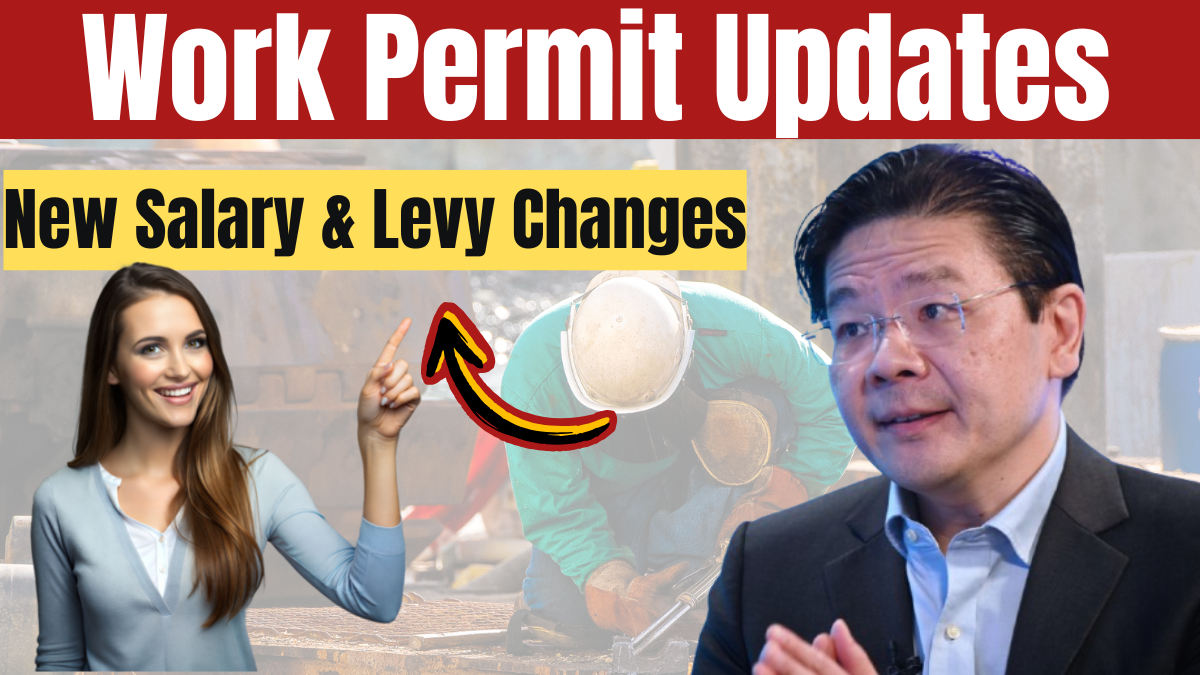Singapore is implementing major updates to its work permit policies in 2025, affecting both foreign workers and employers. The Ministry of Manpower (MOM) aims to optimize the foreign workforce while ensuring that businesses prioritize local talent.

The key changes include:
- Higher salary thresholds for S Pass holders, especially in the financial sector
- Increased levy rates for employers, leading to higher hiring costs
- Stricter hiring policies to encourage local workforce development
Businesses, particularly small and medium enterprises (SMEs), will need to reassess hiring strategies to align with these new regulations.
What Are the New Minimum Salary Requirements for S Pass Holders?
The qualifying salary for S Pass holders will increase in two phases during 2025.
| Sector | Current Salary | From 2025 | From September 1, 2025 |
|---|---|---|---|
| Most Sectors | SGD 3,000 | SGD 3,150 | SGD 3,300 |
| Financial Services | Higher than SGD 3,000 | Higher than SGD 3,150 | Even higher |
This adjustment aims to align wages with the upper one-third of local associate professionals and technicians while attracting skilled foreign professionals.
How Are Levy Rates Changing for S Pass Holders?
Along with salary hikes, levy rates for employers hiring S Pass holders will also increase from September 2025.
| Levy Tier | Current Levy Rate | New Levy Rate (from Sept 2025) |
|---|---|---|
| Tier 1 | SGD 550 | SGD 650 |
| Tier 2 | SGD 650 | Unchanged |
This increase will lead to higher hiring costs for employers, making workforce planning more critical.
How Will These Changes Impact Employers?
With higher salary requirements and levy rates, companies will need to adjust their hiring strategies. Some key approaches businesses may consider include:
- Investing in automation to reduce dependence on foreign labor
- Upskilling local talent to meet workforce demands
- Optimizing workforce distribution to balance costs and productivity
Small and medium enterprises that rely heavily on foreign workers may need to reassess financial planning and hiring policies to sustain their operations.
Why Is Singapore Implementing These Work Permit Changes?
The Singaporean government is making these changes to create a highly skilled and competitive workforce. The objectives include:
- Encouraging businesses to prioritize local hiring and workforce development
- Attracting skilled foreign professionals with higher salary incentives
- Reducing dependency on lower-wage foreign workers
These updates align with Singapore’s long-term economic goals and labor market needs.
What Do These Changes Mean for Foreign Workers?
For S Pass applicants, these updates present both opportunities and challenges.
- Higher salary thresholds mean better earning prospects for skilled workers
- Stricter job competition will require foreign professionals to enhance their qualifications
- Employers will be more selective in hiring foreign workers due to increased costs
Foreign workers looking to remain competitive should focus on gaining relevant certifications, improving skills, and targeting industries in high demand.
FAQs
What is the new S Pass salary requirement in 2025?
The salary requirement will increase to SGD 3,150 in early 2025 and SGD 3,300 from September 1, 2025. The financial sector will have higher thresholds.
Are levy rates increasing for all employers?
Yes, the Tier 1 levy will rise from SGD 550 to SGD 650, while Tier 2 remains unchanged at SGD 650.
Will SMEs struggle with these changes?
Small and medium enterprises that rely on foreign labor may face challenges due to rising hiring costs, making workforce planning essential.
How can foreign workers increase their chances of employment?
Foreign professionals should upgrade their skills, earn relevant certifications, and focus on industries that have high demand for skilled workers.
How do these changes benefit local workers?
The policy ensures higher wages and better job opportunities for local Singaporeans by making businesses prioritize local hiring.
Will employers still hire foreign workers?
Yes, but hiring will be more selective, with a focus on highly skilled professionals who meet the new salary requirements.
What sectors will be most affected?
Industries that rely heavily on foreign labor, such as construction, manufacturing, and services, will experience the most impact.
When do the new regulations take effect?
Initial salary adjustments will begin in early 2025, with further increases and levy rate changes taking effect on September 1, 2025.
Click here to know more.
Aanchal is a passionate writer with a keen interest in storytelling, content creation, and creative expression. She enjoys exploring diverse topics and crafting engaging narratives that captivate readers.
